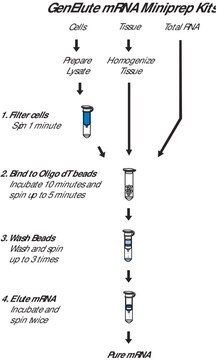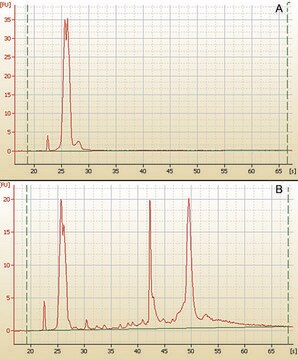DMN70
GenElute™ Direct mRNA Miniprep Kits
sufficient for 70 purifications
Synonym(s):
GenElute™ Direct mRNA Miniprep Kit, GenElute™ mRNA Kit, Gen Elute
About This Item
Recommended Products
Looking for similar products? Visit Product Comparison Guide
Related Categories
General description
For direct mRNA preparation, cells or tissues are disrupted with SDS/proteinase K digestion to release RNA and eliminate RNases. The kit uses oligo (dT) covalently linked to 1 μm polystyrene beads to capture polyadenylated mRNA by hybridization. The polystyrene beads remain suspended during hybridization, eliminating the need for mixing or rocking, as is common for cellulose or magnetic particles. Polystyrene was also chosen because oligo(dT) polystyrene beads yield cleaner mRNA with fewer stringent washing steps than does the more commonly used oligo(dT) cellulose (2 or 3 wash steps versus 10 or more). With the GenElute kits, mRNA-bead complexes are washed on a microcentrifuge spin filter, and eluted into 10 mM Tris-HCL, pH 7.5.
Up to 107 mammalian cells or 40 mg tissue are lysed and homogenized, either with the filtration columns provided or with a mechanical homogenizer. RNase is eliminated during a 10 minute proteinase K digestion. Sodium chloride is added, and polyadenylated RNA is captured on oligo(dT) polystyrene beads during a 10 minute incubation. For further enrichment, RNA may be released from the beads into fresh lysis solution and recaptured with the original beads. After 3 washes in a spin column, purified mRNA is eluted in 100 μL of 10 mM Tris-HCl, pH 7.4.
The purified mRNA is ready for Northern analysis, reverse transcription and PCR, labeling for arrays, and other common applications.
a mechanical homogenizer. RNase is eliminated during a 10 minute proteinase K digestion. Sodium chloride is added, and polyadenylated RNA is captured on oligo(dT) polystyrene beads during a 10 minute incubation. For further enrichment, RNA may be released from the beads into fresh lysis solution and recaptured with the original beads. After 3 washes in a spin column, purified mRNA is eluted in 100 μl of 10 mM Tris-HCl, pH 7.4.
Application
Features and Benefits
- Poly (A)+ mRNA isolated from total RNA in 40 minutes or 60 minutes directly from cells and tissues
- Oligo(dT) polystyrene beads require fewer wash steps
- mRNA captured on oligo(dT) polystyrene beads in 10 minutes, with no mixing or rocking
- mRNA captured on oligo(dT) polystyrene beads in 10 minutes, with no mixing or rocking (Fig. 1)
- Poly (A)+ mRNA isolated from total RNA in 40 minutes (Fig. 2) or 60 minutes directly from cells and tissues (Fig. 3)
- Oligo(dT) polystyrene beads require fewer wash steps
Other Notes
Legal Information
Kit Components Only
- Collection tube 70 ea
- Elution solution 10 mL
- Filtration columns with tubes 70 ea
- Lysis solution 120 mL
- 5 M NaCl 8 mL
- Oligo(dT)-polystyrene beads 2 mL
- Proteinase K 25 mg
- Spin columns with tubes 70 ea
- 40% Glycerol solution 3 mL
Signal Word
Danger
Hazard Statements
Precautionary Statements
Hazard Classifications
Eye Irrit. 2 - Met. Corr. 1 - Resp. Sens. 1 - Skin Irrit. 2 - STOT SE 3
Target Organs
Respiratory system
Storage Class Code
8A - Combustible corrosive hazardous materials
Choose from one of the most recent versions:
Already Own This Product?
Find documentation for the products that you have recently purchased in the Document Library.
Articles
The availability of simple methods for purification of DNA and RNA has greatly facilitated the analysis and characterization of the genome and gene expression. There is a demand to isolate DNA and RNA rapidly and conveniently from a variety of cellular sources, including cells and tissues from mammalian, plant and bacterial cultures.
Our team of scientists has experience in all areas of research including Life Science, Material Science, Chemical Synthesis, Chromatography, Analytical and many others.
Contact Technical Service











